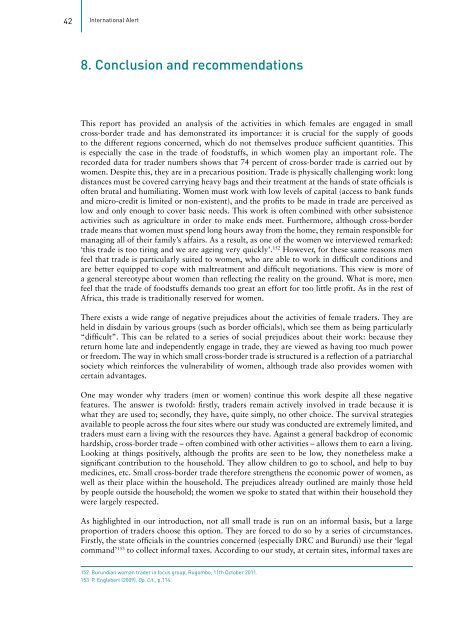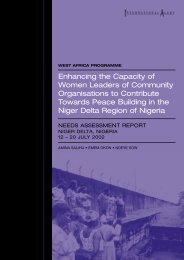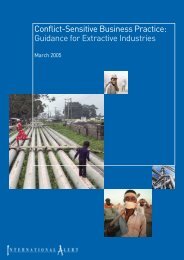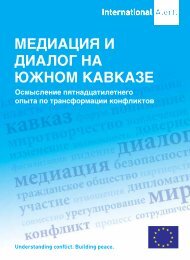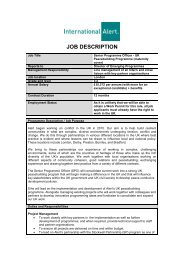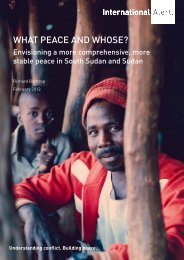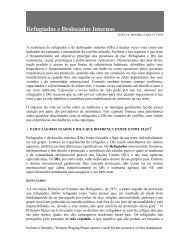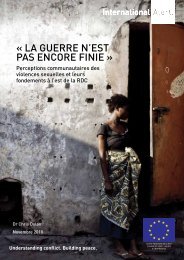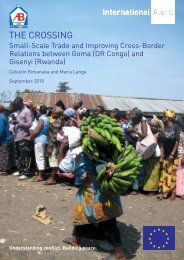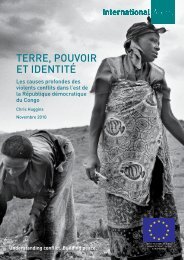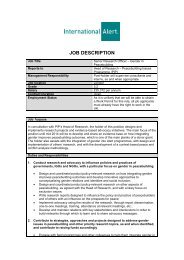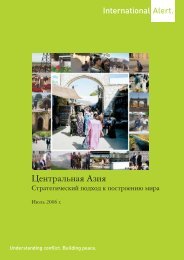Walking in the Dark: informal Cross-border trade ... - International Alert
Walking in the Dark: informal Cross-border trade ... - International Alert
Walking in the Dark: informal Cross-border trade ... - International Alert
You also want an ePaper? Increase the reach of your titles
YUMPU automatically turns print PDFs into web optimized ePapers that Google loves.
42 <strong>International</strong> <strong>Alert</strong><br />
8. Conclusion and recommendations<br />
This report has provided an analysis of <strong>the</strong> activities <strong>in</strong> which females are engaged <strong>in</strong> small<br />
cross-<strong>border</strong> <strong>trade</strong> and has demonstrated its importance: it is crucial for <strong>the</strong> supply of goods<br />
to <strong>the</strong> different regions concerned, which do not <strong>the</strong>mselves produce sufficient quantities. This<br />
is especially <strong>the</strong> case <strong>in</strong> <strong>the</strong> <strong>trade</strong> of foodstuffs, <strong>in</strong> which women play an important role. The<br />
recorded data for <strong>trade</strong>r numbers shows that 74 percent of cross-<strong>border</strong> <strong>trade</strong> is carried out by<br />
women. Despite this, <strong>the</strong>y are <strong>in</strong> a precarious position. Trade is physically challeng<strong>in</strong>g work: long<br />
distances must be covered carry<strong>in</strong>g heavy bags and <strong>the</strong>ir treatment at <strong>the</strong> hands of state officials is<br />
often brutal and humiliat<strong>in</strong>g. Women must work with low levels of capital (access to bank funds<br />
and micro-credit is limited or non-existent), and <strong>the</strong> profits to be made <strong>in</strong> <strong>trade</strong> are perceived as<br />
low and only enough to cover basic needs. This work is often comb<strong>in</strong>ed with o<strong>the</strong>r subsistence<br />
activities such as agriculture <strong>in</strong> order to make ends meet. Fur<strong>the</strong>rmore, although cross-<strong>border</strong><br />
<strong>trade</strong> means that women must spend long hours away from <strong>the</strong> home, <strong>the</strong>y rema<strong>in</strong> responsible for<br />
manag<strong>in</strong>g all of <strong>the</strong>ir family’s affairs. As a result, as one of <strong>the</strong> women we <strong>in</strong>terviewed remarked:<br />
‘this <strong>trade</strong> is too tir<strong>in</strong>g and we are age<strong>in</strong>g very quickly’. 152 However, for <strong>the</strong>se same reasons men<br />
feel that <strong>trade</strong> is particularly suited to women, who are able to work <strong>in</strong> difficult conditions and<br />
are better equipped to cope with maltreatment and difficult negotiations. This view is more of<br />
a general stereotype about women than reflect<strong>in</strong>g <strong>the</strong> reality on <strong>the</strong> ground. What is more, men<br />
feel that <strong>the</strong> <strong>trade</strong> of foodstuffs demands too great an effort for too little profit. As <strong>in</strong> <strong>the</strong> rest of<br />
Africa, this <strong>trade</strong> is traditionally reserved for women.<br />
There exists a wide range of negative prejudices about <strong>the</strong> activities of female <strong>trade</strong>rs. They are<br />
held <strong>in</strong> disda<strong>in</strong> by various groups (such as <strong>border</strong> officials), which see <strong>the</strong>m as be<strong>in</strong>g particularly<br />
“difficult”. This can be related to a series of social prejudices about <strong>the</strong>ir work: because <strong>the</strong>y<br />
return home late and <strong>in</strong>dependently engage <strong>in</strong> <strong>trade</strong>, <strong>the</strong>y are viewed as hav<strong>in</strong>g too much power<br />
or freedom. The way <strong>in</strong> which small cross-<strong>border</strong> <strong>trade</strong> is structured is a reflection of a patriarchal<br />
society which re<strong>in</strong>forces <strong>the</strong> vulnerability of women, although <strong>trade</strong> also provides women with<br />
certa<strong>in</strong> advantages.<br />
One may wonder why <strong>trade</strong>rs (men or women) cont<strong>in</strong>ue this work despite all <strong>the</strong>se negative<br />
features. The answer is twofold: firstly, <strong>trade</strong>rs rema<strong>in</strong> actively <strong>in</strong>volved <strong>in</strong> <strong>trade</strong> because it is<br />
what <strong>the</strong>y are used to; secondly, <strong>the</strong>y have, quite simply, no o<strong>the</strong>r choice. The survival strategies<br />
available to people across <strong>the</strong> four sites where our study was conducted are extremely limited, and<br />
<strong>trade</strong>rs must earn a liv<strong>in</strong>g with <strong>the</strong> resources <strong>the</strong>y have. Aga<strong>in</strong>st a general backdrop of economic<br />
hardship, cross-<strong>border</strong> <strong>trade</strong> – often comb<strong>in</strong>ed with o<strong>the</strong>r activities – allows <strong>the</strong>m to earn a liv<strong>in</strong>g.<br />
Look<strong>in</strong>g at th<strong>in</strong>gs positively, although <strong>the</strong> profits are seen to be low, <strong>the</strong>y none<strong>the</strong>less make a<br />
significant contribution to <strong>the</strong> household. They allow children to go to school, and help to buy<br />
medic<strong>in</strong>es, etc. Small cross-<strong>border</strong> <strong>trade</strong> <strong>the</strong>refore streng<strong>the</strong>ns <strong>the</strong> economic power of women, as<br />
well as <strong>the</strong>ir place with<strong>in</strong> <strong>the</strong> household. The prejudices already outl<strong>in</strong>ed are ma<strong>in</strong>ly those held<br />
by people outside <strong>the</strong> household; <strong>the</strong> women we spoke to stated that with<strong>in</strong> <strong>the</strong>ir household <strong>the</strong>y<br />
were largely respected.<br />
As highlighted <strong>in</strong> our <strong>in</strong>troduction, not all small <strong>trade</strong> is run on an <strong>in</strong>formal basis, but a large<br />
proportion of <strong>trade</strong>rs choose this option. They are forced to do so by a series of circumstances.<br />
Firstly, <strong>the</strong> state officials <strong>in</strong> <strong>the</strong> countries concerned (especially DRC and Burundi) use <strong>the</strong>ir ‘legal<br />
command’ 153 to collect <strong>in</strong>formal taxes. Accord<strong>in</strong>g to our study, at certa<strong>in</strong> sites, <strong>in</strong>formal taxes are<br />
152 Burundian woman <strong>trade</strong>r <strong>in</strong> focus group, Rugombo, 11th October 2011.<br />
153 P. Englebert (2009). Op. Cit., p.114.


